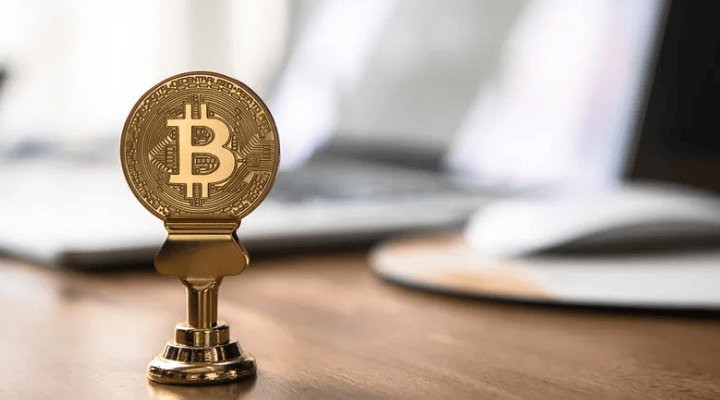The Government’s Bitcoin Piggy Bank
At the heart of the BITCOIN Act is the creation of a “Strategic Bitcoin Reserve.” Think of it as a high-tech Fort Knox, but instead of gold bars, it’s filled with digital gold — Bitcoin. The bill proposes setting up super-secure storage facilities all across the country to keep these Bitcoins safe.
Now, you might be wondering, “Why does the government need a Bitcoin piggy bank?” Well, just like how countries have stockpiles of gold to back up their economies, this bill suggests that Bitcoin could play a similar role in our digital age. It’s like the government is saying, “Hey, this crypto stuff might be the future, so we better get on board!”
A Shopping Spree Like No Other
Here’s where things get really interesting. The bill doesn’t just want to create a Bitcoin vault; it wants to fill it up — big time. The plan? Buy a whopping 200,000 Bitcoins every year for five years. That’s a total of 1 million Bitcoins!
To put this in perspective, as of August 2024, there are only 21 million Bitcoins that will ever exist. So, the U.S. government is essentially saying, “We want to own nearly 5% of all the Bitcoin in the world.” That’s like going to a pizza party and claiming an entire pizza for yourself before anyone else gets a slice!
This massive purchase plan could have huge implications for the Bitcoin market. With such a large buyer entering the scene, we might see Bitcoin prices skyrocket. For those already holding Bitcoin, this could mean watching your digital piggy bank grow fatter. And for those who haven’t jumped on the Bitcoin bandwagon yet, it might be a sign that it’s time to consider it.
Transparency: No More Hiding in the Shadows
One of the coolest parts of this bill is how it handles transparency. The government isn’t just planning to buy a ton of Bitcoin and keep it hush-hush. Nope, they’re promising to be super open about it.
The bill introduces something called a “Proof of Reserve” system. It’s like a regular show-and-tell, but for Bitcoin. Every three months, the Treasury would have to publish reports showing exactly how much Bitcoin they have, where it’s stored, and prove they actually control it.
This is a big deal because it sets a new standard for transparency in government finances. Imagine if you could check exactly how much money your city has in its bank account, anytime you want. That’s the level of openness we’re talking about here.
States Get a Slice of the Pie
The BITCOIN Act isn’t just about the federal government. It’s also inviting states to join the Bitcoin party. If a state wants to, it can store its own Bitcoin in the national reserve, kind of like having a special savings account at a really secure bank.
This is pretty revolutionary. It means that even if your state government decides to get into Bitcoin, they’d have a super safe place to keep it. It’s like offering states a high-tech piggy bank that’s protected by the best security the nation has to offer.
Paying for the Bitcoin Bonanza
Now, you might be thinking, “This all sounds great, but who’s going to pay for all this Bitcoin?” Good question! The bill has some clever ideas about that too.
It proposes using money from the Federal Reserve’s surplus funds and some of the profits the Fed usually sends to the Treasury. It’s a bit like using the change you find in your couch cushions to buy something valuable — except in this case, the couch is the entire U.S. financial system, and the change is billions of dollars.
There’s also a plan to update how the government handles gold certificates with the Federal Reserve. It’s a bit technical, but essentially, it’s about making better use of the gold the U.S. already owns to help fund this Bitcoin initiative.
Your Bitcoin is Your Bitcoin
Here’s something really important: this bill isn’t about the government taking anyone’s Bitcoin. In fact, it goes out of its way to say that the government can’t seize or confiscate Bitcoin from private citizens.
This is huge because it shows that the government recognizes Bitcoin as a form of private property. It’s saying, “We want to get into Bitcoin ourselves, but we promise we won’t touch yours.” It’s like the government deciding to start a massive stamp collection but promising not to raid your personal collection to do it.
Why This Matters to You
You might be thinking, “Okay, but I’m not into Bitcoin. Why should I care?” Well, here’s the thing: this bill could have far-reaching effects on our economy and your financial future, whether you’re into crypto or not.
1. Economic Impact: If the U.S. government becomes a major Bitcoin holder, it could stabilize the Bitcoin market. This stability could make Bitcoin more attractive as an investment or even as a way to save money.
2. Innovation Boost: By embracing Bitcoin, the U.S. could position itself as a leader in financial technology. This could lead to more jobs in the tech sector and more innovative financial services for everyone.
3. Financial Security: Just as the gold reserve once provided a backstop for the U.S. dollar, a Bitcoin reserve could offer a new kind of financial security in our digital age.
4. Global Influence: If the U.S. takes this bold step, it could influence how other countries view and handle cryptocurrencies, potentially reshaping the global financial landscape.
The Road Ahead: A Bitcoin Standard and the $35 Trillion Question
As we wrap up our exploration of the BITCOIN Act, let’s tackle the elephant in the room — or should we say, the 35 trillion-dollar gorilla. The United States is currently grappling with a staggering national debt of over $35 trillion. It’s a number so large it’s hard to wrap our heads around. But could a move towards a Bitcoin standard help address this monumental challenge?
The idea of a Bitcoin standard — where Bitcoin plays a role similar to what gold once did in our financial system — is both exciting and controversial. Proponents argue that Bitcoin’s fixed supply could act as a check on government spending and inflation, potentially helping to rein in runaway debt.
Here’s how it might work: As the government accumulates Bitcoin, it could use this asset as a form of collateral or as a way to back its currency. The limited supply of Bitcoin could encourage more disciplined fiscal policies, as the government wouldn’t be able to simply “print more money” to cover its debts.
Moreover, if Bitcoin continues to appreciate in value (as it has historically, despite its volatility), the government’s Bitcoin holdings could become an increasingly valuable asset. This could potentially provide a new source of wealth to offset national debts or fund critical programs without increasing the tax burden on citizens.
Of course, this is all speculative and would represent a massive shift in how our financial system operates. It’s not without risks and challenges. Critics might argue that tying our economy too closely to a relatively new and volatile asset like Bitcoin could introduce new forms of instability.
However, the BITCOIN Act represents a first step towards exploring these possibilities. It’s a bold move that acknowledges the changing nature of our digital economy and seeks to position the United States at the forefront of this financial revolution.
As we look to the future, the idea of a Bitcoin standard offers a glimmer of hope in addressing our nation’s fiscal challenges. It suggests a path where technological innovation and sound monetary policy could work hand in hand to create a more stable and prosperous economy.
The BITCOIN Act of 2024 isn’t just about the government buying Bitcoin — it’s about reimagining our financial future. It’s a testament to the growing recognition that digital assets like Bitcoin have a role to play in our economic landscape.
Whether this bill passes or not, it has already achieved something significant: it has brought the conversation about Bitcoin and its potential role in our economy into the mainstream. It challenges us to think differently about money, about the role of government in our financial lives, and about how we can use technology to build a more transparent and stable economic future.
As we stand on the brink of this potential financial revolution, one thing is clear: the world of finance is changing, and the BITCOIN Act of 2024 could be a pivotal moment in that transformation. It’s an exciting time to be alive, folks — we might just be witnessing the birth of a new financial era. So, keep your eyes on this space, because whether you’re a Bitcoin believer or a crypto skeptic, the decisions made about this bill could shape your financial future in ways we’re only beginning to imagine.

 English
English
 Deutch
Deutch
 Espanol
Espanol
 Francais
Francais
 Portugues
Portugues
 日本
日本
 한국인
한국인
 Türk
Türk
 Русский
Русский
 Tiếng Việt
Tiếng Việt

